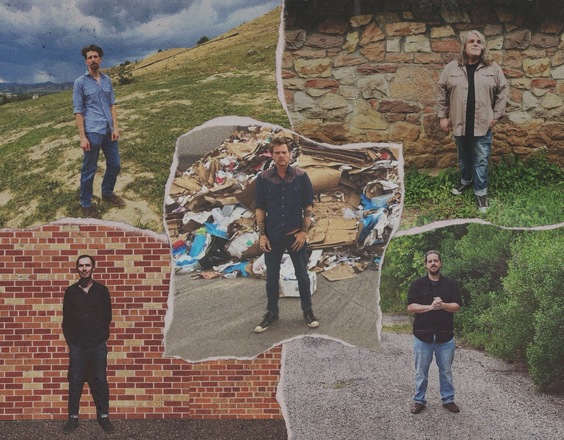On their web site, the Gasoline Lollipops slot themselves among the alt-country crowd, and the rock crowd,AND the Americana crowd. It’s not that they can’t make up their minds, it’s that they don’t concern themselves with being pigeonholed, so you needn’t either. “For so long I thought we had to have a genre,” says frontman/songwriter/visionary Clay Rose. “At first it was a cow-punk band, then I needed a rock band, then a folk rock band, then I needed a country band, then I needed an Americana band. But I guess coloring inside the lines is not in my cards.” Bully for that. Outside the lines is where things get interesting. It’s a necessary evil to liken an artist to a better-known commodity, so how about the Jayhawks (with balls) and Nick Drake? Tom Petty and Leonard Cohen meeting for coffee. James McMurtry remaking the Black Crowes in his own image. A side-salad of Muscle Shoals with a tangy dash of Stax. Yadda yadda. Short answer, the Gas Pops sound like the United States of America. Thesongs on their new album, All the Misery Money Can Buy (due out on September 11, 2020 on Soundly Music), back it up. In sturdy, hard-bitten, no-nonsense elegies, Clay takes snapshots of dusty wanderlust.
It’s all masterfully concise, with 11 songs populated by restless souls who live entire lives in three minutes, mining triumph out of desperation, chasing the American Dream, and “choking on a pot of gold.” “What I took from Leonard Cohen was the value of a word,” Clay says, “If it’s not needed, it doesn’t go on the page. You whittle a lyric down to its essence, say it once, and that’s enough.” Clay comes by the wanderlust honestly. When he was growing up in Boulder, Colo., his mother spent the lion’s share of her time in Nashville writing songs. (She wrote “Last Thing I Needed, First Thing This Morning”, recorded by both Willie Nelson and Chris Stapleton.) Clay would periodically join her there, fomenting a disjointed existence with a foot in the Rockies and the other in the Tennessee backwoods. Clay’s father was a card-carrying vagabond, who after successfully dodging the draft took up both driving a truck (with a young Clay often in the passenger seat) and selling pot, as one of the biggest dealers in his part of the planet. (Willie Nelson was one of his most faithful customers.) Clay’s gypsy lifestyle began even before he was born, when attention from the feds convinced his father that relocating from Arkansas to Colorado might be a good idea.

The disjointed childhood between Boulderand Leiper’s Fork, Tenn. put Clay in a constant state of culture shock. He didn’t fit in anywhere, beingtoo crass for the New Age Boulder culture and too liberal for Leiper’s Fork. Clay soon developed a penchant for fighting and as a result, became familiar with jails and psych wards on both sides of the Mississippi. Sobriety and love changed his story as Clay would pick up more lonesome folksinger vibes from his wife, Sofia, whose recent ancestors really weregypsies, in Latvia. “She continues to dress the part,” Clay wryly points out. (For the record, they have two children, and Clay’s a good father, not the least for having been sober four years now.)
A benefit of recording in Louisiana was the local female backing vocals talent, lending a sound with a foot in the church and the other on Bourbon Street. “The reason we recorded in Louisiana was twofold,” Clay says. “First, we wanted to get some of that greasy Southern rock and soul sound, and secondly, because we would like to open a dialogue with our fellow Southern working class. Typically, folks in the South that dig our sound tend to be a bit conservative. I don’t want to condemn them, I want to have a conversation and identify common ailments — dangerous, underpaid, overtime work weeks; spotty healthcare; poor and overpriced higher education; and other things.” Such a statement leads to another aspect of Clay’s songwriting and the Gas Pops’ stance in general: a political and social conscience permeates the lyrics and the music itself. The title track, Clay notes, concerns “the failed capitalist model which leads the working class over a cliff chasing a dangling carrot.” “Dying Young” is about climate change: “The Earth is what’s dying young,” he explains. “The second verse is a lullaby I wrote for my son. Thought it fitting as he’ll be inheriting this wounded planet.”
The anthemic “Lady Liberty” was inspired by the #MeToo movement: “Engorged machismo, the driving energy behind capitalism has raped, repressed, and silenced the feminine energy that could otherwise balance and heal our people,” he says. “Get Up” is a call to action “to all those oppressed and enslaved by the daily grind. Student loans, medical bills, credit card debt, and a 60-hour work week, just to keep greasing the one percent’s crankshaft with our blood, sweat, and tears.” In this day and age, when everyone is so numb and artists appear terrified of alienating anyone, the Gas Pops evoke the sorely needed passion of artists like Springsteen and Joe Strummer before them. They lay it on the line. And like any good bandleader/torch bearer, Clay isn’t shy about it. As for the sounds themselves, the Gas Pops are genuine virtuoso musicians who understand that in this line of work virtuosity is like garlic: a little goes a long way. Drummer Kevin Smith is a classically trained music educator who has played in the Colorado Symphony Orchestra. Bassist Bradley “Bad Brad” Morse has a Bachelor’s degree in jazz studies, orchestral experience and award-winning bluegrass work under his belt. Keyboardist/organist Scott Coulter is a recognized authority on the Hammond B-3 organ; his fleet-fingered work recalls Billy Preston and even John Lord of Deep Purple. Guitarist Donny Ambory, another educated jazzer, moves with élan between fluid Hendrix-style chord melodies and frenetic string mangling like the best work of Albert Lee.
The whole band — perfectly capable of hot-dogging all over each other like your worst Dave Matthews nightmare — never play their instruments, they play the song. The Gas Pops are three-time winners of Colorado Daily’s “Best Local Band” award, and two-time winners of Denver alt-weekly Westword’s “Best Country Band” award. Over the last four years, they have toured throughout the U.S., Belgium, the Netherlands, and Belize. In 2018 they made Billboard’s Top 10 Spotify chart, as well as Pandora’s Top 10 Trendsetters list. Today, bringing you All The Misery Money Can Buy, the Gas Pops continue to color outside the lines.


